高级商务英语1 unit8Crisis Management
商务英语综合教程第一册Unit 8 Job And Health

Background Information
• An occupational disease is any chronic ailment that occurs as a result of work or occupational activity. It is an aspect of occupational safety and health. An occupational disease is typically identified when it is shown that it is more prevalent in a given body of workers than in the general population, or in other worker populations. The first such disease to be recognised, squamous-cell carcinoma of the scrotum was identified in chimney sweepboys by Sir Percival Pott in 1775. Occupational hazards that are of a traumatic nature (such as falls by roofers) are not considered to be occupational diseases.
Text Analysis
• envelope
• 1. N-COUNT An envelope is the rectangular paper cover in which you send a letter to someone through the mail. 信封
专业英语八级核心词汇

专业英语八级核心词汇Professional English Level 8 Core Vocabulary。
Introduction:In this document, we will explore the core vocabulary required for the Professional English Level 8 examination. This comprehensive list of words will help candidates improve their language skills and enhance their proficiency in the professional context. The following sections will cover various domains, including business, finance, marketing, technology, and more.Business Vocabulary:1. Entrepreneurship: The process of starting and managing a business venture.2. Strategic planning: The process of defining an organization's objectives and determining the best way to achieve them.3. Leadership: The ability to guide and inspire others towards a common goal.4. Innovation: The introduction of new ideas, products, or processes.5. Collaboration: Working together with others to achieve a common objective.6. Negotiation: The process of reaching an agreement through discussion and compromise.7. Stakeholder: An individual or group with an interest or concern in a business or project.8. Sustainability: The practice of using resources in a way that meets present needs without compromising future generations' ability to meet their own needs.Finance Vocabulary:1. Asset: Something of value owned or controlled by a person, organization, or country.2. Liability: A financial obligation or debt.3. Revenue: Income generated from business activities.4. Profitability: The ability of a business to generate profit.5. Cash flow: The movement of money in and out of a business.6. Investment: The act of putting money into something with the expectation of gaining a return or profit.7. Risk management: The process of identifying, assessing, and prioritizing risks to minimize their impact on business operations.8. Capital: Financial resources available for investment.Marketing Vocabulary:1. Market segmentation: Dividing a market into distinct groups based on characteristics, needs, or behaviors.2. Branding: The process of creating a unique name, design, or symbol that identifies and differentiates a product or company.3. Advertising: The promotion of products or services through various media channels.4. Consumer behavior: The study of individuals, groups, or organizations and the processes they use to select, secure, use, and dispose of products, services, experiences, or ideas.5. Market research: The collection and analysis of data to understand and interpret market trends, customer preferences, and competitor strategies.6. Product placement: The inclusion of branded products or references in entertainment media.7. Public relations: The management of communication between an organization and its publics.8. Sales promotion: Short-term incentives to encourage the purchase or sale of a product or service.Technology Vocabulary:1. Artificial intelligence: The simulation of human intelligence in machines that are programmed to think and learn.2. Big data: Large and complex data sets that require advanced techniques to analyze and interpret.3. Cloud computing: The practice of using a network of remote servers hosted on the internet to store, manage, and process data.4. Cybersecurity: Measures taken to protect computer systems and networks from unauthorized access or attacks.5. Internet of Things (IoT): The network of physical devices, vehicles, appliances, and other objects embedded with sensors, software, and connectivity to exchange data.6. Virtual reality: A computer-generated simulation of a three-dimensional environment that can be interacted with in a seemingly real or physical way.7. Blockchain: A digital ledger in which transactions made in cryptocurrencies are recorded chronologically and publicly.8. Data mining: The process of discovering patterns in large data sets using techniques at the intersection of statistics and computer science.Conclusion:Mastering the core vocabulary for Professional English Level 8 is essential for individuals seeking to excel in the professional world. This document has provided an extensive list of words in various domains, including business, finance, marketing, and technology. By incorporating these words into their everyday language, candidates can enhance their communication skills and increase their chances of success in the professional arena.。
《高级综合商务英语1》参考答案

高级商务英语系列教材总主编:叶兴国王光林高级综合商务英语1主编:彭青龙(习题答案)外语教学与研究出版社Unit 1 GlobalizationLead-in1. Quiz1) B 2) C 3) D 4) A 5) A2. A Mini CaseSuggested answers:●As Zara continues to expand, it might have to open other distribution centers onother continents. Language, culture, and work relations may vary significantly from the closely-managed operation currently in place in Spain. The company may run into more specific challenges in accommodating customers‘requirements due to a lack of cultural sensitivity. Zara‘s expansion globally may pose the challenge of moving from a more centralized management style to a more global style.●Lorena needs to ensure that she has a truly international team in place withmembers from both multilingual and multicultural background; draw up a plan on how global logistics will support global expansion; start a succession plan and train new logistics managers who could be ready to take on overseas responsibilities; and encourage store managers to include suggestions on cultural specifics which may help in making the final product and brand expansion successful.Text AI.Reading Comprehension1.Determine whether the following statements are true or false. Write a T fortrue, an F for false, and an NG for not given.1) T 2) F 3) T 4) F 5) F 6) T 7) T 8) F 9) T 10) NG2.Essay Questions1)The modern multinational companies have had passed through three phases. Firstcame the 19th-century ―international model‖, with firms based in their home country and selling goods through overseas sales offices. This was followed by the classic multinational firm in which the parent company created smaller versions of itself in countries around the world. And now it has been replaced by a single integrated global entity in which the firm will move people and jobs anywhere in the world, based on the right cost, the right skills and the right business environment.2)The big attractions from emerging markets are low-cost labor, highly skilledpersonnel, and a chance to cooperate with the government as a potential customer.3)They are lacking the management talents who can practice and support businessoperating models that will allow them to generate profitable growth in more mature markets over the long term.4)The single biggest challenge facing Western multinationals is the lack ofemerging-market experience in their senior ranks. Moreover, multinationals have great trouble retaining the managers they do have in emerging markets.―Well-trained, good, honest people are scarce in emerging markets. Multinationals are better at training these people than emerging-market companies, which prefer to poach them once they are trained.‖II.Blank-filling: Complete the following sentences with the words given in the box. Change the form when necessary.1) cutting-edge 2) commoditized 3) aggressive 4) forge 5) benchmark 6) blueprint 7) expatriates 8) deploy 9) ferocious 10) substantial III.Paraphrasing1.Rewriting: Rewrite the underlined part of each sentence in your own words.1) ―In the 97 years of the company‘s history, never had a particular kind of product or merchandise been managed outside the U.S.,‖he says excitedly, noting that ―Latin America now reports to Shanghai.‖2) But the assault on its services business led by a trio of Indian outsourcing upstarts, Tata Consulting Services, Infosys and Wipro, posed a big threat to the field that might be the main sources of growth for the company as expected by Mr. Palmisano.3) In many emerging markets the most attractive potential customer is the government, because of the government‘s urgent needs to improve the infrastructure facilities in a wide range, from the mobile telephone networks to roads, airports and ports, energy and water supply.4) A 2007 study of China‘s top 200 publicly traded companies found that it is still difficult even for the leading companies in China to compete with those global giants.5) American multinationals now have a ―ferocious interest in attracting non-Americans to the board‖, but they can find only a few qualified executives from the European countries, not to mention those from emerging markets.2. Sentence Transformation: Complete the following sentences based on the structures given.1) Because of the fact that hot labor markets in emerging markets are causing extremely high turnover rates, every big multinational is aiming to win the ―war for talent‖ and taking it as one of the most urgent issues.2) It is believed that as a big multinational company it enjoys advantages in recruiting and retaining talented managers than the local competitors.3) Despite the growth of their revenue which increased on the back of China‘s continued economic growth, they could only create half of the value of their global competitors.4) No longer the ―young bucks or retirement-posing types‖as they used to be,nowadays the expatriate managers appointed by multinationals to work in emerging markets are generally of a much higher quality.5) Compared with those old multinationals, the firms in emerging markets are typically lacking the depth of management talent, though the founders are often impressive.IV.Translation1.Sentence Translation1) 这一雄心勃勃的策略是对来自新兴市场的激烈竞争做出的回应。
(完整word版)高级综合商务英语IUnit8TextAACrisisMadeinJapan
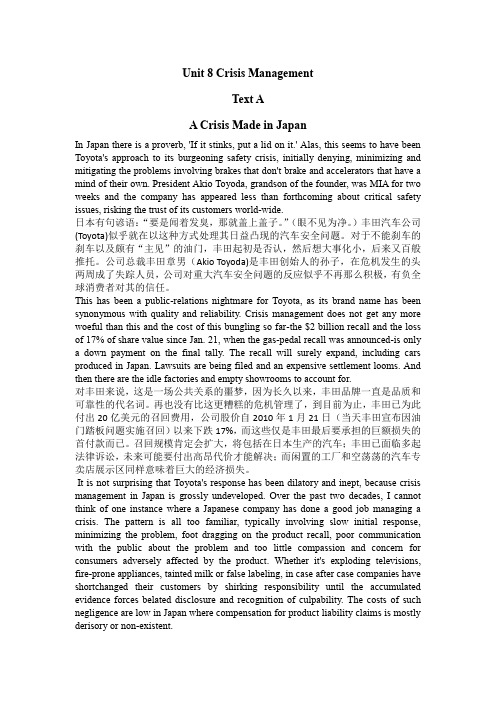
Unit 8 Crisis ManagementText AA Crisis Made in JapanIn Japan there is a proverb, 'If it stinks, put a lid on it.' Alas, this seems to have been Toyota's approach to its burgeoning safety crisis, initially denying, minimizing and mitigating the problems involving brakes that don't brake and accelerators that have a mind of their own. President Akio Toyoda, grandson of the founder, was MIA for two weeks and the company has appeared less than forthcoming about critical safety issues, risking the trust of its customers world-wide.日本有句谚语:“要是闻着发臭,那就盖上盖子。
”(眼不见为净。
)丰田汽车公司(Toyota)似乎就在以这种方式处理其日益凸现的汽车安全问题。
对于不能刹车的刹车以及颇有“主见”的油门,丰田起初是否认,然后想大事化小,后来又百般推托。
公司总裁丰田章男(Akio Toyoda)是丰田创始人的孙子,在危机发生的头两周成了失踪人员,公司对重大汽车安全问题的反应似乎不再那么积极,有负全球消费者对其的信任。
This has been a public-relations nightmare for Toyota, as its brand name has been synonymous with quality and reliability. Crisis management does not get any more woeful than this and the cost of this bungling so far-the $2 billion recall and the loss of 17% of share value since Jan. 21, when the gas-pedal recall was announced-is only a down payment on the final tally. The recall will surely expand, including cars produced in Japan. Lawsuits are being filed and an expensive settlement looms. And then there are the idle factories and empty showrooms to account for.对丰田来说,这是一场公共关系的噩梦,因为长久以来,丰田品牌一直是品质和可靠性的代名词。
职通商务英语(第三版)综合教程1 Unit 8-1
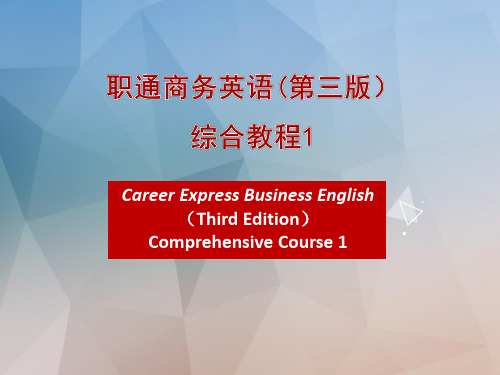
◎ Comprehensive Tasks
Intensive Reading
Read the text opposite and finish the following comprehensive tasks. (1) What is the customer service? (2) How do we define excellent customer services? (3) What is the relationship between the service representatives and the company? (4) Explain how to perform excellent customer services according to the text. (5) In what sense are customer services regarded as crucial to the businesses?
Lead-in Task 1: Talk about customer services.
3 (3) Complaint handling: Customer complaints provide an opportunity to identify and rectify specific problems in your business. They can also help you to develop your relationship with your customer by allowing you to demonstrate that you value their trade by taking their concerns seriously.
高职高专英语I Unit 8教案

课程名称:新世纪高职高专英语Period 1Unit 8 This generation means business授课内容:1. Understand the Text:This generation means business2. Explain the key words and structures in the text.目的要求:1. Learn something about this generation start their businesses and becomesuccessful in life.2. Master the key words and structures in the text有关记录:板书设计:Unit 8 This generation means businessbank⏹development bank⏹Commercial bank⏹Investment bank⏹Construction bankbank card⏹credit card⏹Check card⏹Gift cardbank account⏹checking account⏹Savings account⏹Certificates deposits⏹Individual retirement accountsUnit 8 This generation means businessI.Lead in( 15 minutes)Ask the students to discuss in pairs something about how to start their own businesses and become successful in life, and then ask some pairs to tell their opinions to the whole class.Q1: What did Joe Lampson announce when he was 21 years old?Q2:What kind of software did Lampson try to develop to solve the problem?Q3: Why couldn’t venture capitalists finance Lampson’s new company?II. Read in ( 65 minutes)1. Background Information ( 5 minutes)1) CEOs (chief executive officers)CEOs are among the highest paid workers; however, long hours, considerable travel, and intense pressure to succeed are common. The formal education and experience of CEOs vary as widely as the nature of their responsibilities. Keen competition is expected because theprestige and high pay attract a large number of qualified applicants.2) Credit CardA credit card gives you the power to buy goods or services now and pay for them later. It represents an approval by a bank or company to use their money. Credit card issuers are usually banks, even though the card may bear another company name or logo. The name of the issuer appears somewhere on the card. Trade names such as VISA and MasterCard are not actually card issuers. They are termed “membership associations.” Banks use them for their payment processing services, policy setting and marketing assistance.2. Developing vocabulary (30 minutes)1)dream of: imagine sth. 梦见,梦想e.g. Some people dream of success while others wake up and work hard at it.2) start up: begin a career, working life, etc. 开始从事事业、工作等e.g. start up a new bus company 建立新的公共汽车公司e.g. start up in business 在事业上起步3) achieve: v. perform or carry out with success; accomplish 胜利完成;实现e.g.The university has achieved all its goals this year.e.g.Charles A. Lindbergh achieved a great success by flying the first nonstop solo flight acrossthe Atlantic.4) announce:v. make known publicly 宣布e.g.The government announced that they would build a new highway to the mountain.drop out: leave school, university, etc. without finishing it 中途退学e.g.She got a scholarship to Cambridge but dropped out a year later.Extended words: dropper, droppingsCollocations: drop behind 落伍, 落后drop back 退后, 后撤drop by顺便访问一下5) launch: v.1) set or thrust a self-propelled craft or projectile in motion 发射e.g. launch a rocket2) set going; initiate 发动;开始e.g. launch a careere.g. launch a business ventureExtended words: launchable6) streamline: v. improve efficiency of; modernize 改善效率;使现代化e.g. We must streamline our production procedures.Extended words: streamlined, streamliner7) instinct: n. a natural ability to know what you should do without having to learn or thinkabout it 本能, 直觉e.g.Trust your instincts and do what you think is right.e.g.Birds learn to fly by instinct.Extended words: instinctive, instinctively8) average: a. usual or ordinary in kind or character 普通的,寻常的e.g. He is about average height.e.g. a poll of average people; average eyesightExtended words: averagely, averagenessRelated words: medium, middle, ordinary, usual9) finance: v. supply funds to 给……提供资金e.g. The government will finance the building of the new crossroads with the taxes it collects.10) enterprise: n. a business organization 企业,公司e.g. He successfully managed a state-owned enterprise.Extended words: enterprise less, enterpriser11) turn t o: go to sb./sth. for help, advice, etc.向某人/某事物寻求帮助或指教e.g. The child turned to his mother for comfortCollocations: turn over翻转turn on打开turn away解雇turn off关掉turn in上交turn down拒绝3.Detail study of the text (30 minutes)Paragraph One- Two1) Comprehension QuestionsQ:What did Joe Lampson announce when he was 21 years old?A: He announced that he was leaving Stanford to launch his own software company.2) Main ideaJoe Lampson’s decision surprised his father.Joe Lampson’s program improved the trading situation in business.3)Difficult sentenceNo,” Joe said…being first is everything.”Turning down his father’s request, Joe insisted that a leading position in the software business is a key factor in his career journey.Paragraph Three1) Comprehension QuestionsQ: What kind of software did Lampson try to develop to solve the problem?A: He wanted to develop a computer program that could help companies to calculate which supplier offered the best price while meeting all the customer’s needs.2) Main ideaNo investment in Lampson’s company at first.3)Difficult sentenceYet buying and selling ― the lifeblood of business ― was still being done by instinct.Companies do business with most customers instinctively-the lifeblood of business-was still being done by instinct.Paragraph Four1) Comprehension QuestionsQ: Why couldn’t venture capitalists finance Lampson’s new company?A: Because Lampson had neither experienced managers nor experienced technicians.2) Main ideaJoe Lampson was once heavily in debt.3)Difficult sentenceBanks told him to get lost.Banks told him to go away.Paragraph Five1) Comprehension QuestionsQ:what happened since then ?A :Since his program worked well,other fortune 500 companies wanted to buy the right to use the program.2) Main ideaJoe Lampson became very successful.3)Difficult sentenceSo he turned to…of his generation: plastics.Finally Joe had to overdraw his credit cards, which is known among people of his age as a big investment bankParagraph Six1) Comprehension QuestionsQ: Why did Lampson persuade engineers at Hewlett-Packard to test the Trilogy software?A: Because the company had tried to develop a similar program.2) Main ideaThe situation of today’s Trilogy Development Group.3)Difficult sentenceSince then, orders from other Fortune 500 companies have flooded in.After that, other companies among the Fortune 500 companies sent a large number of orders to Trilogy.Paragraph Seven1) Comprehension QuestionsQ:What do you know about the Trilogy Development Group?A :It is located in Austin, Texas. It has about 400 employees and more than $120 million income in 1996.2) Main ideaThe contemporary trend in the American youth.4)Difficult sentenceParagraph Eight-Ten1) Comprehension QuestionsQ:What is your answer to this question?A :Perhaps it is the pioneering spirit of some successful young entrepreneurs that has inspired more and more young people in America.Q: Why do today’s young people have to grow up fast?A :Because they have to be well prepared to handle anything in the future.2) Main ideaThe young Americans dream about owning their own businesses.3) Difficult sentenceSince then, orders…have flooded in.After that, the other companies among the fortune 500 companies have flooded in.They were like explorers…to handle anything.On their way to success, they had to overcome all the difficulties, just like explorers in a jungle who had to cut their way through.III. Exercise ( 10 minutes)Practice Ex. IIV. Assignments1.Review the text and the key words/phrases2.Finish off Ex. II – Ex. VI3.Preview Grammar; Reading skills; Practical reading and writingV. ExpandOnline learningPeriod 2Unit 8 This generation means business 授课内容:1. Grammar: The Disjunctive Question2. Reading skills: Prereading3. Practical Reading: Reading Indexes and Contents4. Practical Writing: Cover Letter目的要求:1. Master the use of The Disjunctive Question2. Master the reading skill:Prereading3. Learn how to read indexes and contents4. Learn how to Cover Letter有关记录:板书设计:Grammar: The Disjunctive Question反意疑问句◆陈述部分谓语含有need或dare时,疑问部分就要根据这两个词的功能来决定。
高级综合商务英语I Unit8 Text A A Crisis Made in Japan
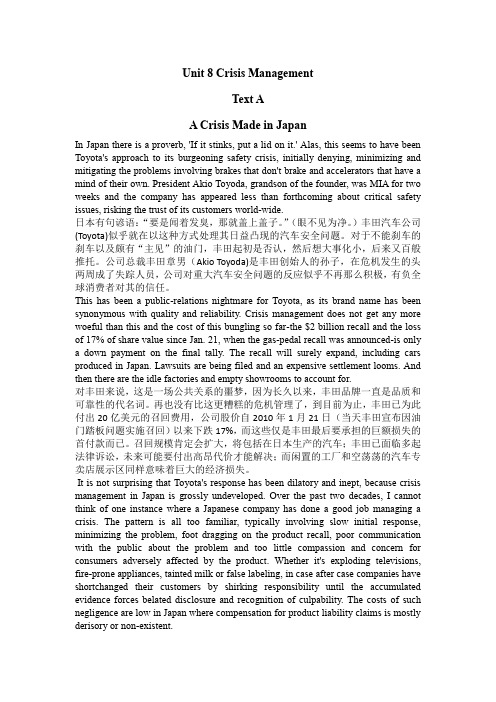
Unit 8 Crisis ManagementText AA Crisis Made in JapanIn Japan there is a proverb, 'If it stinks, put a lid on it.' Alas, this seems to have been Toyota's approach to its burgeoning safety crisis, initially denying, minimizing and mitigating the problems involving brakes that don't brake and accelerators that have a mind of their own. President Akio Toyoda, grandson of the founder, was MIA for two weeks and the company has appeared less than forthcoming about critical safety issues, risking the trust of its customers world-wide.日本有句谚语:“要是闻着发臭,那就盖上盖子。
”(眼不见为净。
)丰田汽车公司(Toyota)似乎就在以这种方式处理其日益凸现的汽车安全问题。
对于不能刹车的刹车以及颇有“主见”的油门,丰田起初是否认,然后想大事化小,后来又百般推托。
公司总裁丰田章男(Akio Toyoda)是丰田创始人的孙子,在危机发生的头两周成了失踪人员,公司对重大汽车安全问题的反应似乎不再那么积极,有负全球消费者对其的信任。
This has been a public-relations nightmare for Toyota, as its brand name has been synonymous with quality and reliability. Crisis management does not get any more woeful than this and the cost of this bungling so far-the $2 billion recall and the loss of 17% of share value since Jan. 21, when the gas-pedal recall was announced-is only a down payment on the final tally. The recall will surely expand, including cars produced in Japan. Lawsuits are being filed and an expensive settlement looms. And then there are the idle factories and empty showrooms to account for.对丰田来说,这是一场公共关系的噩梦,因为长久以来,丰田品牌一直是品质和可靠性的代名词。
高级商务英语1unit8CrisisManagement

Unit eight
• …shedding the constraints of a fusty corporate culture and wowing customers with a recall and above and beyond after sales service and care (Para. 8)
• In most cases of quality crises, Japanese companies habitually think lightly of their customers by shirking their responsibilities and the costs of such belittlement and negligence are low. But drug company executives paid dearly for selling tainted blood: a rather generous settlement of compensation and an abject apology.
Unit eight
• companies have shortchanged their
customers by shirking responsibility until the accumulated evidence forces belated disclosure and recognition of culpability.
Unit eight
• above-and-beyond (Para.8) • adj. exceeding what is required or expected • example:
《金融英语》习题答案unit1-10
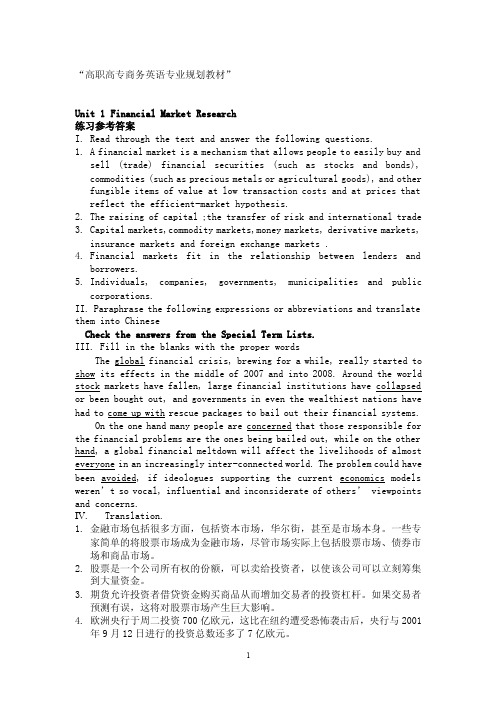
“高职高专商务英语专业规划教材”Unit 1 Financial Market Research练习参考答案I.Read through the text and answer the following questions.1.A financial market is a mechanism that allows people to easily buy andsell (trade) financial securities (such as stocks and bonds), commodities (such as precious metals or agricultural goods), and other fungible items of value at low transaction costs and at prices that reflect the efficient-market hypothesis.2.The raising of capital ;the transfer of risk and international trade3.Capital markets,commodity markets,money markets, derivative markets,insurance markets and foreign exchange markets .4.Financial markets fit in the relationship between lenders andborrowers.5.Individuals, companies, governments, municipalities and publiccorporations.II. Paraphrase the following expressions or abbreviations and translate them into ChineseCheck the answers from the Special Term Lists.III. Fill in the blanks with the proper wordsThe global financial crisis, brewing for a while, really started to show its effects in the middle of 2007 and into 2008. Around the world stock markets have fallen, large financial institutions have collapsed or been bought out, and governments in even the wealthiest nations have had to come up with rescue packages to bail out their financial systems.On the one hand many people are concerned that those responsible for the financial problems are the ones being bailed out, while on the other hand, a global financial meltdown will affect the livelihoods of almost everyone in an increasingly inter-connected world. The problem could have been avoided, if ideologues supporting the current economics models weren’t so vocal, influential and inconsiderate of others’ viewpoints and concerns.IV.Translation.1.金融市场包括很多方面,包括资本市场,华尔街,甚至是市场本身。
《高级综合商务英语1》翻译答案
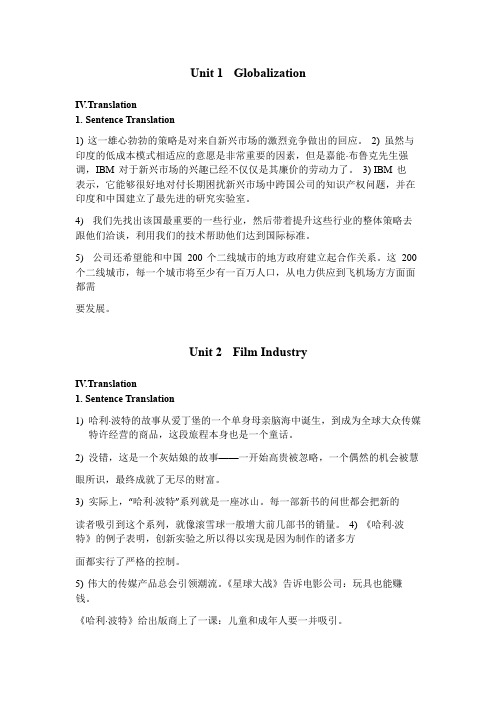
Unit 1 GlobalizationIV.Translation1.Sentence Translation1) 这一雄心勃勃的策略是对来自新兴市场的激烈竞争做出的回应。
2)虽然与印度的低成本模式相适应的意愿是非常重要的因素,但是嘉能·布鲁克先生强调,IBM 对于新兴市场的兴趣已经不仅仅是其廉价的劳动力了。
3) IBM 也表示,它能够很好地对付长期困扰新兴市场中跨国公司的知识产权问题,并在印度和中国建立了最先进的研究实验室。
4)我们先找出该国最重要的一些行业,然后带着提升这些行业的整体策略去跟他们洽谈,利用我们的技术帮助他们达到国际标准。
5)公司还希望能和中国200 个二线城市的地方政府建立起合作关系。
这200 个二线城市,每一个城市将至少有一百万人口,从电力供应到飞机场方方面面都需要发展。
Unit 2 Film IndustryIV.Translation1. Sentence Translation1)哈利·波特的故事从爱丁堡的一个单身母亲脑海中诞生,到成为全球大众传媒特许经营的商品,这段旅程本身也是一个童话。
2)没错,这是一个灰姑娘的故事——一开始高贵被忽略,一个偶然的机会被慧眼所识,最终成就了无尽的财富。
3)实际上,“哈利·波特”系列就是一座冰山。
每一部新书的问世都会把新的读者吸引到这个系列,就像滚雪球一般增大前几部书的销量。
4) 《哈利·波特》的例子表明,创新实验之所以得以实现是因为制作的诸多方面都实行了严格的控制。
5) 伟大的传媒产品总会引领潮流。
《星球大战》告诉电影公司:玩具也能赚钱。
《哈利·波特》给出版商上了一课:儿童和成年人要一并吸引。
Unit 4 Information TechnologyIV.Translation1.Sentence Translation1)一月份发布会之前,公众的期待就被煽动得无比高涨,即便是依照乔布斯自己的苛刻标准,这也是不寻常的。
综合商务英语1(已完成)Unit 8 Markets

他皮肤下的青筋像绳索一样暴突出来。
2. flashy adj.浮华的,俗丽的; 招摇的;
I just want a good reliable car, nothing flashy.
He was much less flashy than his brother. 他远没有他的兄弟那么招摇。
covering, encrusted. Walls crusted with dirt.
(Cerberus Capital Management)。戴姆勒- 克莱斯勒公司2007年10月04日发表公报更名为 戴姆勒股份公司(Daimler AG),正式结束了戴 姆勒-克莱斯勒公司的历史。
Wபைடு நூலகம்lcome to Moscow, City of the Gold Rolls-Royce
Luxury Brands
APEC –Asia Pacific Economic Coorperation forum
ASEAN- Association of Southeast Asian Nations
EU-The European Union
NAFTA-North American Free Trade
Daimler Chrysler 戴姆勒-克莱斯勒
A test market is tried to see is people are likely to buy.
A profitable market allows companies to make money.
Financial markets
Financial markets is the general term for the buying and selling of shares, bonds(often government loans) and commodities (oil, metal, agricultural products).
高级商务英语1复习资料.doc
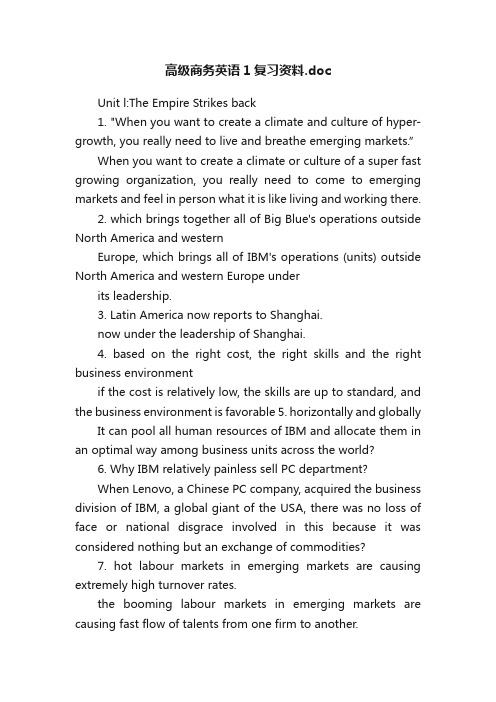
高级商务英语1复习资料.docUnit l:The Empire Strikes back1. "When you want to create a climate and culture of hyper-growth, you really need to live and breathe emerging markets.”When you want to create a climate or culture of a super fast growing organization, you really need to come to emerging markets and feel in person what it is like living and working there.2. which brings together all of Big Blue's operations outside North America and westernEurope, which brings all of IBM's operations (units) outside North America and western Europe underits leadership.3. Latin America now reports to Shanghai.now under the leadership of Shanghai.4. based on the right cost, the right skills and the right business environmentif the cost is relatively low, the skills are up to standard, and the business environment is favorable 5. horizontally and globally It can pool all human resources of IBM and allocate them in an optimal way among business units across the world?6. Why IBM relatively painless sell PC department?When Lenovo, a Chinese PC company, acquired the business division of IBM, a global giant of the USA, there was no loss of face or national disgrace involved in this because it was considered nothing but an exchange of commodities?7. hot labour markets in emerging markets are causing extremely high turnover rates.the booming labour markets in emerging markets are causing fast flow of talents from one firm to another.8.IBM reckons that its global reach gives it an edge in recruitment and retention over local rivals.its global expansion helps it maintain a competitive advantage over local competitors in terms of the talents it hires and the longer time it keeps the talents9?thanks to an infrastructure boom that promises to span everythingdue to fast growth in the infrastructure construction business, which is estimated to cover every possible project from..?lO.There is still a striking lack of executives from emerging markets at the top of developed-country multinationals There are still very few local executives who can climb to the top management of developed-co un try multi nationals.11 ?the breadth and depth of management talentbreath=varied and divers讦ied management talentsdepth=experieneed and seasoned management talentsHead of strategy:?略发展总监hyper-growth:super fast growth Emerging market:新市场growth markets:成长型市场;增长型市Big blue:nickname for IBM 国际商业机器公Perennial:Iong-lasting; recurring; enduringline business: An LOB (line-of-business) is a general term thatdescribes the products or services offered by a business or manufacturer. In some large enterprise cultures, the term line-of-business (LOB) is used as a synonym for corporate division.cutting-edge: leading-edge; sophisticated; hi-techCommoditised: con verted into a commodityOutsourci ng:夕卜包The contracti ng or subc on tracti ng of non core activities to free up cash, personnel, time, and facilities for activities in which a company holds competitive advantage.Compa nies havi ng stre ngths in other areas may con tract out data processi ng, legal, manufacturing, marketing, payroll accounting, or other aspects of their businesses to concentrate on what they do best and thus reduce average unit cost. Outsourcing is often an integral part of downsizing or reengineering. Also called contracting out?承包Upstarts:firms that have risen suddenly to a position of power or wealth 新贵Pools: group of people available for work when required nJ 招ZR卩来的——些人:a pool of doctors available for emergency work为应付紧急悄况而待命的一些医生Tur no ver rate: A huma n resources metric which expresses the number of employees lost through firing, attrition and other means compared to the total number of employees in the company.人员流动率chief procurement officer: A chief procurement officer (CPO) is an executive role focused on sourcing, procurement, and supply management for an enterprise?首席采购官sales pitch:推销游说Pitchi ng: trying directly to persuade governments to buy this business or to make a deal with governments for this businessBlueprint: a set of proposals/plans expatriate managers;expat managers:海夕卜派遣经理at short notice:with notification only a little in advance bottom-of-the-pyramid: An economic term referring to the largest but the poorest socio-economic group constituting more than 2.5 billion people that live on less than $2.50 a day?金字塔底层executive suites:The term ”executive suites'1 referred tothe suite of offices on or near the top floor of a skyscraper where the top executives of a company work, usually in eluding at least the president or chief executive officer, various vice presidents and their staff?行政套房Fbach:legally catch 猎取Unit 2:The Harry Potter Economy1 ?“the tip of a publishing iceberg”constituting the smallest proportion of total sales generated by the publishing house2. there was no point bidding against the firm for a childrenf s titleIt was impossible to beat the firm in the com pet it io n for the market of children's books ?3. an article in the New York Times asked "Harry who?Two new adventure stories are now in the swim: the Greek myths, and the Arthurian legends. The Harry Fbtter model is out of fashion.4. The project appeared “too British for the studios but too big to be a British productio nThe movies appeared "too British for the American studios to man age well, but they are also too expensive to be produced solely in UK.”5. her “worst nightmare" was that her hero would end up on the side of fast-food contai nersthe image of her hero (Harry Fitter) would be printed on the side of fast-food containers, which Rowling thought would impact negatively the image of her hero.6. Given the rise of digital media and piracy, Harry Potter may be seen as a high-water mark in the industry?no film other than Harry Potter can make such remarkable achievements in the film industry, especially in box officeperforms nee.Division:Alternative term for business unit.部门market-testing:I1J场测试;销住实验;市场定位技术snowball effect:滚雪球效应;滚雪球似地迅速增人的效应;雪球效果Turnover:W业额,成交量Revenues: money that a business or organization receives over a period of time, especially from selling goods or services (income)Outfit:a business firm engaged in a particular form of commercial enterprisePlindits:a person who knows a lot about a particular subject and who often talks about it in public; an expertrevenue streams:收益源;盈利源A company's revenue stream is the amount of money that it receives from selling a particular product or service?(BUSINESS)The events business, she said, was crucial to the group in that it provides a constant revenue streamBlitz:an advertising or publicity blitz is a major effort to make the public aware of something. On December 8 the media blitz began in earnest.master toy licence:原版使用许可;主许可执照Unit 4:Silicon Valley visionary who put Apple on top1. ground?breaking productIn the hi-tech industry, people had bee n guessi ng about for mon ths what Apple's latest revolutionary product would be before it was debuted?2. there are no second acts in American lifeNo second act means you get one shot at the brass ring of success and even if you manage to grab it, life inevitably goesdownhill to a tragic anti-climax.It seems 99% of pers ons get this wrong, con sidering that it's always quoted in the context of someone or another f s re-emergence on the scene after going into an eclipse? Ftzgerald did NOT mean there are no second chances in American life-but that American lives tend not to have middle acts, when the fruits of our early labors can be appreciated, before going into the inevitable decline of old age?3. there are no second acts in American life does not come more decisively than this.There is nothing more definitely challenging E Scott Fitzgerald's much-quoted witticism that there are no second acts in American life than the act of Steve Jobs whose successful comeback had proved Fitzgerald wrong.4.0f all the fingers that Apple has poked into Microsoft' s eyes over the years, none can have rankled as much as the early success of the iPad.Of all the blows that Apple has dealt to Microsoft over the years, the early success of the iPad has inflicted the most pain to Microsoft.5.it points to a future beyond the computer mouseit points to a trend where the computer mouse is no longera must-have peripheral.6.and a world without Windows?and a computer world no Ion ger dominated by Windows because Apple's Macin tosh has come onto the stage. (I OS vs. Android)7.Sales of cheaper notebook computers are already suffering.The sales of cheaper notebook computers are already beginning to decline? The number of consumers buying Apple'siPad or upscale, higher-priced Mac computers is on the rise/increase.8. a company that has drawn on the openness of the web itself as the model for its own smartphone software.a company whose Android system for smartphones is based on the open Linux kernel and that advocates that the software for smartphones shall not be restricted on the open platform.9. The sophistication of his touch-screen devices is a long way from Mr. Job" s rudimentary start in the garage of his adoptive parents in suburban northern California ?It took Mr. Jobs a long long time to develop his highly sophisticated touch-screen devices, beginning with some simple devices in the garage of his adoptive parents in the suburban northern California?I 0.There was little i n Mr. Jobs* beg innings that gave a hin t of what was to come ?Nothing in Mr. Jobs1 humble beginnings suggested that he would be so successful in the years to come.II ?Mr. Jobs' spiritual aspirations left him with little use for either shoes or soap 6 for long periodSoBack from his spiritual pursuit in India, Mr. Jobs did not wear shoes or take a shower for a long time, which made his co-workers extremely worried?12. That means pushing relentlessly forward rather than milking old successes - even ones as significant as the iPod?That means he pushes forward an innovative project persistently and unyieldingly rather than dwelling/resting on old successes; he is even not satisfied with achievements as significant as the iPod? 13.Others now have Apple in their sights, forcing Mr. Jobs into the competitive moves that would oncehave seemed out of character.Others now see Apple as their target to pursue (enemy to conquer), which forced Mr. Jobs to take countermeasures so as to gain competitive advantages over his rivals, but this seemed quite unusual for Mr. Jobs for he was often too proud to care about competing with others. 14.a prouder Steve Jobs would not have let out the door.Steve Jobs was too proud to admit that he had imitated the product of others and thus limited the use of Ping to iTunes users only. I n other words, it had not been released for public trial.Visionary:If you refer to someone as a visionary,you mean that they have strong, original ideas about how things might be different in the future, especially about how things might be improved ?vision :愿景;视觉;远见In business,vision is foresight - the capacity to envisage future market trends and plan accordi nglyVision StatementAn aspirational description of what an organization would like to achieve or accomplish in the mid-term or Iong-term future. It is intended to serve as a clear guide for choosing current and future courses of action.Mission Statement?A written declaration of an organizatiorfs core purpose and focus that normally remains unchanged over time? Properly crafted mission statements (1) serve as filters to separate what is important from what is not, (2) clearly state which markets will be served and how, and (3) communicate a sense of inten ded directi on to the en tire organizati on.A mission is different from a vision in that the former is thecause and the latter is the effect; a mission is something to be accomplished whereas a vision is something to be pursued for thataccomplishment. Also called company mission, corporate mission, or corporate purpose.Sdelined: to prevent sb from playing in a team, especially because of an injury: The player has bee n sideli ned by a knee in jury.to prevent sb from having an important part in sth that other people are doing: The vice-presidentis increasingly being sidelined.washed up:No Ion ger successful or needed; finished; done.written off:If you write someone or something off, you decide that they are unimportant or useless and that they are not worth further serious attention.Seal:TD establish or determine irrevocably: Our fate was sealed?Rebo un d: (especially busi ness) a positive recovery/react io n that happe ns after sth n egative whipped up:to try to make people feel strongly about something; stirred upDisparagingly:slightingly; derogatorily; express a negative opinion ofreality distortion field:现实扭曲力场Reality distortion field (RDF) is a term coined by Bud Tribble at Apple Computer in 1981, to describe company co-founder Steve Jobs* charisma and its effects on the developers working on the Macintosh project? Tribble said that the term came from Star Trek. Later the term has also bee n used to refer to perceptio ns of his keynote speeches (or H St eve notes1') by observers and devoted users of Apple computers and products?The RDF was said by Andy Hertzfeld to be Steve Jobs1 ability to convince himself and others to believe almost anything with a mix of charm, charisma, bravado, hyperbole, marketing, appeasement and persistence? RDF was said to distort an audienee's sense of proportion and scales of difficulties and made them believe that the task at hand was possible?suspension of disbelief:Suspension of disbelief or willing suspension of disbelief is a term coined in 1817 by the poet and aesthetic philosopher Samuel Taylor Coleridge, who suggested that if a writer could in fuse a n human interest and a sembla nee of truth11 into a fan tastic tale, the reader would suspend judgment concerning the implausibility of the narrative? Suspension of disbelief often applies to fictional works of the action, comedy, fantasy, and horrorinitial public offering IPO:肖次公开券股肖次公开发行;肖次公开招股The first sale of stock by a company to the public? Companies offering an IPO are sometimes new, young companies, or sometimes companies which have been around for many years but are fin ally decidi ng to go public ? I POs are ofte n risky inv estme nts, but often have the potential for significant gains? IPOs are often used as a way for a young company to gain necessary market capital.Rankled:cause lasting bitterness or resentmentDigerati: People who are kno wledgeable about digital tech no logies such as computer programming and design conjured from nothing:lf you conjure something out of nothing, you make it appear as if by magic. premium prices : Premium pricing 溢价政策(also called image pricing or prestige pricing) is the practice of keeping the price of a product or serviceartificially high in order to encourage favorable perceptions among buyers, based solely on the price. The practice is intended to exploit the tendency for buyers to assume that expensive items enjoy an exceptional reputation or represent exceptional quality and distinctiori. A premium pricing strategy involves setting the price of a product higher than similar products? This strategy is sometimes also called skim pricing because it is an attempt to “skim the cream" off the top of the market. It is used to maximize profit in areas where customers are happy to pay more, where there are no substitutes for the product, where there are barriers to entering the market or when the seller cannot save on costs by producing at a high volume?Luxury has a psychological association with premium pricing. The implication for marketing is that consumers are willing to pay more for certain goods and not for others? T D the marketer, it means creating a brand equity or value for which the consumer is willing to pay extra? Marketers view luxury as the main factor differentiating a brand in a product category.venture capitalist:风险资本家;风险投资家;风险投资人A venture capitalist is a pers on who in vests in a busi ness ven ture, providing capital for start-up or expansion. Venture capitalists are looking for a higher rate of return than would be given by more traditional in vest me nts.Generally, venture capitalists are looking for returns of 25 percent and up.What's the difference betwee n a ven ture capitalist and an an gel investor?A venture capitalist is a professional investor. He or she manages a fund and is looking for suitable in vest me nts for that fund. An an gel in vest or is an individual who, while also looki ngfor a suitable investment, is also looking for a personal opportunity?In other words, the venture capitalist may have no business experienee applicable to the industry your company is involved in, and is focused on the potential rate of return your compa ny can provide. An an gel in vest or often has busi ness experie nee releva nt to your company and is interested in adding value to your company, as well as making a return on his or her in vestment ?Stint=tenure: A stint is a period of time which you spend doing a particular job or activity or working in a particular place?占有 (职位)Vision ary: If you refer to someone as a visionary, you mean that they have strong, original ideas about how things might be different in the future, especially about how things might be improved.W 远见的、有预见性的Milking:If you say that some one milks somethi ng, you mean that they get as much ben efit or profit as they can from it, without caring about the effects this has on other people.call the shots:定调子(ALSO call the tune; wear the trousers)to be in the position of being able to make the decisi ons which will influe nee a situati on exercise authority or be in chargeLieutenant:an assist a nt with power to act when his superior is absent; deputy 畐U FPragmatism means thinking of or dealing with problems in a practical way, rather than by using theory or abstract principles.实用?k义Mass Market:大众市场;人规模市场;大量市场Un-segmented market in which products with mass appealproducts (aspirin, orange juice, soft drinks, paperback romances, etc.) are offered to every customer through mass retailers or independent stores, and promoted through mass media?Niche Market:小众市场Expediency= convenienee means doing what is convenient rather than what is morally right. (FORMAL) eg:This was a matter less of morals than of expediency?利己、方便Concern: firm; company; businessme-too: a company's me-too product is one that is designed to be similar to a very popular product made by another companysand their fin gers down:sand down: to make a surface smooth by rubbing it with san dpaper Antitrust:反托拉斯的,反垄断的In the Un ited States, antitrust laws are in tended to stop large firms taki ng over their competitors, fixing prices with their competitors, or interfering with free competition in any way.Unit 5:The post-modern craving for creativity1. Pixar achieved its dominanee by making astonishing shifts in what was thought possible in animated filmmaking.Pixar became a market leader by making the impossible possible in animated filmmaking: theyhad made amazing groundbreaking achievements in the existing animation world?2. unproductive recreations offering no more value than a little R&R.The purpose of recreations is not to gen erate profits or in comes but to get nothi ng but a little rest and entertainment.3. placing this type of work on a par with the financial industry.making creative work rank equally with the financial work.4. And what role does creativity play in energy bra nds and how does it drive consumers to gravitate toward them?How does creativity contribute to vigorous and dynamic brands and how does it attract consumers gradually and irresistibly to them?5. maybe 農progress” isn't all that it'd been made out to b e?maybe it had been found out by people that modernism means much more than "progress11 only.6. deriving meaning out of life eludes many of us day by day.Many of us seems to forget what they live for.7. Like nine-year-olds wrestling with the question of Santa ClausLike children of nine years old who are always uncertain about whether Santa Claus really exists8. consumers are torn between wanting to believe modernist promises and being too savvy to suspend disbelief?consumers are very ambivale nt 矛盾的:on one hand, they want to believe what the modernist has promised; on the other hand, they do not want to believe in modernism blindly because they know very well that modernism cannot solve all their problems,e?g. understanding the meaning of life or human purpose.9.1 t's a conflict that few marketers can recognise.We know consumers do not want to be deceived 欺骗by marketing, but we also know no consumers will buy our products without marketing10. Yet we've found that creative bra nds transce nd their skepticism of marketing, allowing them to believe with no senseof hypocrisy, thus resolving the conflict?Yet we've found that creative brands clear the doubts in the head of consumers and make them believe in a real sense what is promoted in marketing. In this way, creative brands have solved the conflict satisfactorily.11 ?Creativity is embedded in the spirit of irresistible brands?What differentiates super brands from other less successful brands is creativity.12. there is n evertheless a sign ifica nt negative correlati on betwee n happ in ess and wealth?The more fortunes one possesses, the less happy one becomes?13. u So many lucky men, restless in the midst of abundance.MSo many people made a fortune overnight and they were unable to stay still or be happy where there were, when they were surrounded by material abundanee. depopulated : 人口减少reduce in population; desolate the Bureau of Labour Statistics :芳动统计局Creative services are a subsector of the creative industries, a part of the economy that creates wealth by offering creativity for hire to other businesses. Creative Services also means a department within a company that does creative work such as writing, designing, and producti on. It is ofte n a sub-department of the Marketi ng organizati on. Examples in elude: Design and production agenciesStudios Ideation consultancies Software development firms Temp agencyMarketing firmsPublic relati ons age ncies Advertisi ng age ncies Promotio nal age ncies Brandi ng age ncies Entertainment I ndustries币lent agency GuildsLike lawyers and accountants in the professional services sector, creative services firms sell a specialised technical service to satisfy the needs of companies that do not have this expertise themselves ?paradigm-shiftin:典范转移;典范移转;范式转换A radical change in thinking from an accepted point of view to a new one, necessitated when new scientific discoveries produce anomalies in the current paradigm.Modernism:American modernism, like modernism in general, isatrend of thought that affirms the power of human beings to create, improve, and reshape their environment, with the aid of scientific knowledge, technology and practical experimentation, and is thus in its essence both progressive and optimistic. American modernism is an artistic and cultural movement in the United States starting at the turn of the 20th century with its core period between World War I and World War II and continuing into the 21st century.negative correlation 负和关性A relationship between two variables in which one variable increases as the other decreases, and vice versa. In statistics, a perfect negative correlation is represented by the value while a 0.00 in dicates no correlation and a +1.00 in di cates a perfect positive correlation. A perfect n egative correlati on means that the relati on ship that appears to exist betwee n two variables is n egative 100% of the time .It is also possible that two variables may be n egatively correlated in some, but not all, cases.Here are a few examples of a negative correlation: The more time I spend at the mall, the less money I have in my checking account. The more hours I spend at the office, the less time Ispend with my family.cul-de-sac: blind alley —端不通的街道;死胡同.Bisociation:界类联想;界态混搭;界类混搭It is a study of the processes of discovery, invention, imagination and creativity in humour, science, and the arts. It lays out Koestler's attempt to develop an elaborate general theory of humancreativity.From describing and compari ng many differe nt examples of inventio n and discovery, Koest I er concludes that they all share a comm on patter n which he terms H bisociati orT - a blending of elements drawn from two previously unrelated matrices of thought into a new matrix of meaning by way of a process involving comparison, abstraction and categorisation, analogies and metaphors?He regards many different mental phenomena based on comparison (such as analogies, metaphors, parables, allegories, jokes, identification, role-playing, acting,personification, anthropomorphism etc.), as special cases of “bisociation”.The concept of bisociation has been adopted, generalised and formalised by cognitive linguists Giles F^ucorrnier and Mark Turner, who developed it into conceptual blending theory.frames of reference参照系;参考系;参考架构a structure of concepts, values, customs, views, etc., by means of which an individual or group perceives or evaluates data, communicates ideas, and regulates behavior.Overall context in which a problem or situation is placed, viewed, or interpreted. A too-narrow frame may leave out critical factors, whereas a too-broad frame may in elude many irreleva nt distractions.an in creme ntal and expone ntial idea1」n creme ntal inn ovati on is taking products, solutions and tech no logies which you curre ntly have today and doing some small advanceme nt on the same tech no logies or solutio ns The humble bicycle has evolved over time with new materials (particularly in the frames) new comp orients (no gears back in the old days), and accessories such as lights ?2. lech no logy is ever in creasing and ever advancing. We know this through Moore? s Law. And, technology has impacts that expand like the ripples on a pond. From the center (the developme nt and release of a new tech no logy) to the outermost ripple that seems un related ?An expone ntial idea is the one that helps in the fast across-the-board inno vat io n of the organization, involving business models, manufacturing processes, products and services, etc.Differentiation产品差界化;产品分化;产品差界性A marketing process that showcases the differences between products? Differentiation looks to make a product more attractive by contrasti ng its unique qualities with other com pet i ng products ? Successful product differentiation creates a competitive advantage for the seller, as customers view these products as unique or superior.Product differe ntiatio n can be achieved in many ways .It may be as simple as packagi ng the goods in a creative way, or as elaborate as incorporating new functional features? Sometimesdiffere ntiation does not involve ch a nging the product at all, but creati ng a new advert i si ng campaign or other sales promotions instead?Unit 7:BMW Drives Germany1. BMW has mastered the manufacturing fine arthighly developed techniques in manufacturing2. heavily unionized workforcethe workforce in which the percentage of employees that are union members is very high3?rival Audi is turning up the heatapply great or in creased pressure; turn up the pressure4. The recovery “has legs”To have en dura nee; to have prospects to exist or go on fora long time ?5. many German firms did their homeworkmade a careful preparation to fight back6」t, s all about mastering complexity.The recipe for success is to know perfectly well how to achieve synergy through merging complementary competencies?7. Putting BMW on a more efficient footing at home has enabled it to expand its product line in all directions?Maki ng BMW run more efficiently in the homeland of Germa ny8. But it makes up in price and prestige what it lacks in volume?the low sales of Rolls-Royce are offset by its high price and good reputation.9?“BMW' s main weakness is that life is get ting ever narrower in the premium segment, and it needs volume growth.the customer base in the upscale market is getting smaller, so BMW needs to grow fast in the volume of sales.Dealership 商品特许经销商:a business established or operated under an authorization to sell or distribute a company's goods or services in a particular area; franchise。
《高级综合商务英语1》参考答案

《高级综合商务英语1》参考答案参考答案-高级综合商务英语1IntroductionIn this article, we will provide a comprehensive overview of the answers for the course "Advanced Integrated Business English 1". This course focuses on various aspects of business language and communication skills, covering topics such as effective presentations, negotiation tactics, and intercultural business communication. By understanding the correct answers to these questions, students will have a solid foundation in advanced business English.Section 1: Effective Presentations1. What are the key elements of a successful business presentation?- Clear and concise introduction- Well-structured content- Engaging visuals- Effective use of language- Confident body language- Convincing conclusion2. How can you grab the audience's attention at the beginning of a presentation?- Start with a captivating story or anecdote related to the topic- Pose a thought-provoking question- Use shocking statistics or facts- Begin with a relevant quote or proverb3. What strategies can be utilized to maintain audience engagement during a presentation?- Incorporate interactive elements, such as mini quizzes or group discussions- Use visuals and multimedia to illustrate key points- Include personal anecdotes or examples to make the content relatable- Ask rhetorical questions to stimulate audience thinkingSection 2: Negotiation Tactics1. What is the importance of preparation in negotiation?Preparation plays a crucial role in negotiation as it allows individuals to:- Identify their objectives and priorities- Understand the other party's interests and needs- Research and gather relevant information- Develop a strategy and anticipate potential counterarguments2. What are some effective negotiation tactics?- Active listening to understand the other party's perspective- Building rapport and maintaining a positive relationship- Clearly articulating one's interests and needs- Offering and negotiating concessions- Utilizing persuasive language and supporting arguments with evidence3. How can cultural differences impact negotiation strategies?Cultural differences can influence negotiation strategies in several ways:- Communication styles: Direct or indirect communication norms- Decision-making processes: Consensus-based or individual-based decision-making- Power dynamics: Hierarchical or egalitarian power structures- Time orientation: Short-term or long-term focusSection 3: Intercultural Business Communication1. What are the challenges of intercultural business communication?- Language barriers: Differences in vocabulary, pronunciation, and grammar- Nonverbal cues: Varied interpretations of body language and gestures- Cultural norms: Different expectations regarding greetings, formality, and directness- Contextual understanding: Potential misunderstandings due to diverse backgrounds and experiences2. How can intercultural communication be improved in a business setting?- Develop cultural sensitivity and awareness through training and research- Adapt communication styles based on the cultural context- Clarify and confirm understanding through active listening and paraphrasing- Seek feedback and ask questions to bridge potential gaps in understanding3. What role does technology play in intercultural business communication?Technology enables:- Instantaneous communication across different time zones- Remote collaboration through video conferences and virtual meetings- Language translation tools for written and spoken communication- Access to global markets through e-commerce platformsConclusionThis article provided a comprehensive overview of the answers for the course "Advanced Integrated Business English 1". By understanding the key elements of effective presentations, negotiation tactics, and intercultural business communication, students will be equipped with the necessary skills to excel in the dynamic world of business. Mastering these concepts andstrategies will lead to improved professional communication and increased success in international business endeavors.。
高级综合商务英语1精编版.doc

⋯⋯⋯⋯⋯⋯⋯⋯⋯⋯⋯⋯⋯⋯⋯⋯⋯⋯⋯⋯⋯⋯⋯最新料推荐⋯⋯⋯⋯⋯⋯⋯⋯⋯⋯⋯⋯⋯⋯⋯⋯⋯⋯⋯Unit 4今年1 月,史蒂夫?乔布斯(Steve Jobs) 走上旧金山芳草地艺术中心 (Yerba Buena Center) 的舞台发布 iPad ,完成了现代商业史上最引人注目的一次复出。
这不仅仅关乎半年前迫使他退居幕后的疾病。
病魔一度令乔布斯严重消瘦,最终不得不进行肝脏移植手术。
而就在十多年前,几乎所有人认为乔布斯的事业及其共同创立的苹果公司 (Apple) 已经走上绝路。
硅谷和华尔街都断定,它们已经与科技的未来无缘。
然而,到了今年初,苹果已然重生。
在 1 月份的发布会之前,即使是按照乔布斯自己的苛刻标准衡量,外界对苹果的期望程度也是异乎寻常的。
批评者总是用贬抑的口吻谈论乔布斯创造的“现实扭曲场”:他能让观众信服,那些在其他厂商手中似乎尚未成形的技术已经被苹果完美地应用。
为了激起消费者购买他们自己也不知道是否真正需要的电子产品的欲望,打消他们的疑虑极其关键,而乔布斯则早就被公认为这种艺术形式的大师。
在iPad 发布之前的数月内,科技界对苹果这款最新的突破性产品猜测纷纷。
据传它是没有键盘的触摸屏电脑,甚至可以媲美2001年的 iPod 和 2007 年的 iPhone 带来的影响。
在 1 月份的发布会上,乔布斯带上台的iPad 没有让人们失望。
对于 F?斯科特 ?菲茨杰拉德 (F. Scott Fitzgerald)广为流传的名言(美国人的生命中没有第二幕)而言,没有比这更坚决的反驳了。
乔布斯首次登上报纸头条时,甚至比现在的马克?扎克伯格 (Mark Zuckerberg) 还要年轻。
早在书呆子备受追捧之前,由于在普及个人电脑 (PC)中发挥的关键作用,以及苹果在华尔街的成功上市(当时乔布斯年仅 25 岁),乔布斯就成为了科技界的第一个摇滚明星。
如今,三十年过去了,乔布斯成为了在塑造世纪之交的世界中居功至伟的美国西海岸的几大科技巨头之一。
高级职业英语立体化系列教材电子教案1unit 8-Reading and Writing

Section 1 Getting Things Ready
conference n. 会议;会谈 productive a. 富有成效的 accommodation n. 膳宿;住处 transportation n. 交通车辆;车(或船、机)票费 first and foremost 首要的 fix on 确定 keep sth. on track 是某事按着预定计划进行 take into account 考虑
Who will chair the meeting is also crucial to the success of the meeting. An effective chairperson keeps the meeting on track, maintains a positive atmosphere, ensures that nobody hijacks or damages the meeting, and helps all participants contribute most effectively.
words
Section 2 Read and Think
The next meeting planning step is to decide on the time and place. Of course, you want to schedule time when all the participants, or at least the majority, are available. As for meeting location, successful conferences depend very strongly on the venues you choose. Take into account the amount of participants, the subject and goal of the conference. It is also wise that you plan informal moments, in which people can relax a bit.
《高级综合商务英语1》U1-U5选词填空

《高级综合商务英语1》U1-U5选词填空1. Founded in 1908, Hayes Lemmerz is an innovator of cutting-edge technology and products and is the world’s largest manufacturer of automobile.Hayes Lemmerz成立于1908年,是世界上最大的汽车制造商,是尖端技术和产品的创新者。
2. As the content delivered to clients weakens, banks will increasingly need to depend on the more commoditized services they provide, notably capital and trade execution.随着交付给客户的内容减弱,银行将越来越需要依赖他们提供的更为商品化的服务,尤其是资本和贸易执行。
3. This is part of a worldwide movement that France must follow to keep its energetic, aggressive and bright young people and to attract investors.这是法国必须遵循的全球运动的一部分,以保持其年轻人精力充沛,积极进取和聪明,并吸引投资者。
4. Many politicians and the green-energy lobbyists claim we should forge ahead green energy because it will create new employment.许多政客和绿色能源游说者声称,我们应该大力发展/继续推进绿色能源,因为它将创造新的就业机会。
5. Tests at the age of seven provide a benchmark again st which the child’s progress at school can be measured.七岁测试提供了一个基准,可以衡量孩子在学校的进步。
高级商务英语1 unit8Crisis Management优秀课件PPT

Unit eight
1. In Japan, there is a proverb, “If it stinks, put a lid on it.” (Line 1, Para. 1)
• If a situation or a problem arises, seek to cover up or fudge the facts.
Unit eight
• the costs of such negligence are low in
Japan where compensation for product liability claims is mostly derisory or nonexistent.
• Translation
Unit eight
• companies have shortchanged their
customers by shirking responsibility until the accumulated evidence forces belated disclosure and recognition of culpability.
• In most cases of quality crises, Japanese companies habitually think lightly of their customers by shirking their responsibilities and the costs of such belittlement and negligence are low. But drug company executives paid dearly for selling tainted blood: a rather generous settlement of compensation and an abject apology.
商务英语Unit 8(2014)

Questions to check the understanding: 1. In which stage we can apply the technique of target costing? And what is the function of target costing? 2. How to define the target cost? 3. In which areas does Olympic Optical apply value engineering in order to reduce cost ? 4. What is the function of product-specific kaizen costing? How to reduce the cost ?
product costing
Target costing目标成本法 Feed-forward mechanism 前馈机制 Product functionality 产品功能 Profit margin FOB price / CIF price Value engineering价值工程/工程经济 学 7. Labor-intensive 劳动密集 1. 2. 3. 4. 5. 6.
Questions to check the understanding: 1.What are the three benefits to integrated cost management? 2.How can target costing reinforce product-specific kaizen costing? 3.How can target costing reinforce general kaizen costing?
高级综合商务英语unit
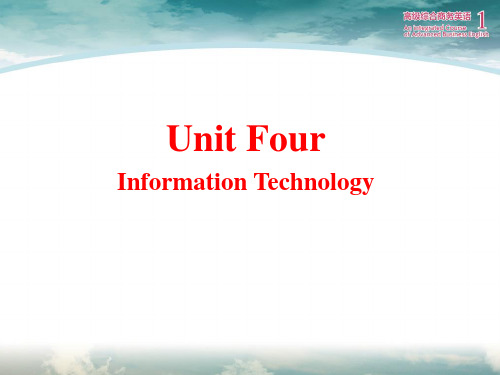
Para. 4-12 An exploration of the art of Steve Jobs to turn
technology into elegant consuming products and the
success Apple is enjoying now.
Para. 13-16 A brief recall of Steve’s early life and his ups and
精选课件
7
Part I Questions about Part I
Q1. Why had the comeback of Steve Jobs stirred up such an excitement?
This was not the first time of comeback for him to Apple. Little more than a decade earlier, he made his first comeback and turned Apple from going bankruptcy to an enormous successful company. Therefore his recovery and comeback were highly anticipated.
精选课件
10
Part I Words and Expressions
cap (Line 2, Para.1) v. lie at the top of… example:
• He capped his friend’s story with an even more exciting one.
• She capped her rage when she heard her husband’s cheating on her.
- 1、下载文档前请自行甄别文档内容的完整性,平台不提供额外的编辑、内容补充、找答案等附加服务。
- 2、"仅部分预览"的文档,不可在线预览部分如存在完整性等问题,可反馈申请退款(可完整预览的文档不适用该条件!)。
- 3、如文档侵犯您的权益,请联系客服反馈,我们会尽快为您处理(人工客服工作时间:9:00-18:30)。
Unit eight
• …shedding the constraints of a fusty corporate culture and wowing customers with a recall and above and beyond after sales service and care (Para. 8)
• Secondly, due to a corporate culture that values team-work, employees‘ loyalty for firms and concern for corporate image override their compassion for consumer interest.
Unit Eight
Crisis Management
What is crisis management?
What are the keys to effective quality crisis management?
Case study: Tylenol
Unit eight
Para. Main Topics Para. 1-7
Unit eight
• And a high-status company like Toyota has
much to lose since its corporate face is at stake. (Line 4, Para. 6)
• Its corporate prestige is at risk for Toyota enjoying a good market standing.
• 在日本,产品责任的赔偿数额低的可怜或 根本没有赔偿,因此,为这种疏忽付出的 代价是很低的。
Unit eight
• Why is the case of blood contamination of
pharmaceutical companies said to be “one glowing exception to this parsimonious record”?
Unit eight
• What cultural inclinations can Japan’s negligence
of crisis management be ascribed to? (para.6-7)
• First, owning up to product defects poses threats to corporate face, especially for such a highstatus company as Toyota in a nation obsessed with craftsmanship and quality.
Unit ht
• …raise the bar on disclosure and assuming
responsibility.( Para. 6) • Paraphrase • raises people‘s standards for under what
circumstances the truth must be revealed and responsibility must be claimed.
• Paraphrase
• companies have treated their customers unfairly by avoiding responsibility until an increasing amount of evidence obliges them to make a delayed move of revealing the truth and confessing their fault.
Unit eight
1. In Japan, there is a proverb, “If it stinks, put a lid on it.” (Line 1, Para. 1)
• If a situation or a problem arises, seek to cover up or fudge the facts.
• Thirdly, the hierarchical corporate structure and a corporate culture of deference prevent the two-way communication between superiors and subordinates.
Unit eight
• deference (Para. 7)
• He is deferential to his superiors. 他对他的 长官、上司毕恭毕敬
Unit eight
• the focus on consensus and group is an asset
in building teamwork, but also can make it hard to challenge what has been decided or designed. (Para. 7)
Unit eight
• the costs of such negligence are low in
Japan where compensation for product liability claims is mostly derisory or nonexistent.
• Translation
Unit eight
loom (Para. 2) • v. hang over, as of something threatening, dark,
or menacing • synonyms: emerge, appear • example:
National self-confidence has been flagging under the threat of looming recession.
• Translation
• 对一致意见和团队的重视是团队合作的优 势,但这也会使公司难以质疑和挑战已经 做出的决定和设计。
Unit eight
• Q1. What’s the main idea of Part II (Para.
8-12)?
• The social, economic and political status of Japan, closely related to Toyota, are impacting Toyota’s reform on quality crisis management.
Unit eight
• Crisis management does not get any
more woeful than this and the cost of this bungling so far … is only a down payment on the final tally. (Line 2, Para. 2) • …is only an initial portion of the total amount in the end.
Unit eight
• companies have shortchanged their
customers by shirking responsibility until the accumulated evidence forces belated disclosure and recognition of culpability.
Unit eight
• Outside director / non-executive director /inside director
• Any member of a company's board of
directors who is not an employee or stakeholder in the company. Outside directors are paid an annual retainer fee in the form of cash, benefits and/or stock options. Corporate governance standards require public companies to have a certain number or percentage of outside directors on their boards as they are more likely to provide unbiased opinions.
Unit eight
• penchant (Para. 6)
• n. a strong liking(强烈的)倾向,爱好 • synonym: aptitude • example:
It is noticed that Chinese customers have a penchant for products projecting national pride in traditional Chinese culture.
